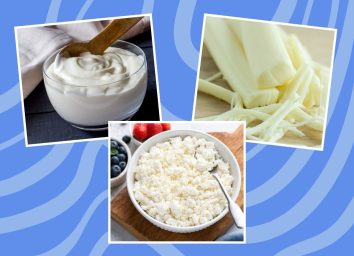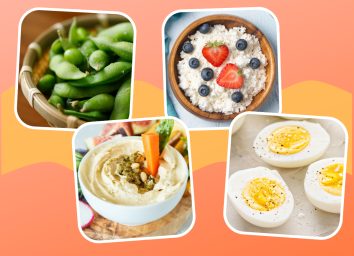9 Brain-Boosting Foods to Enhance Your Cognitive Function
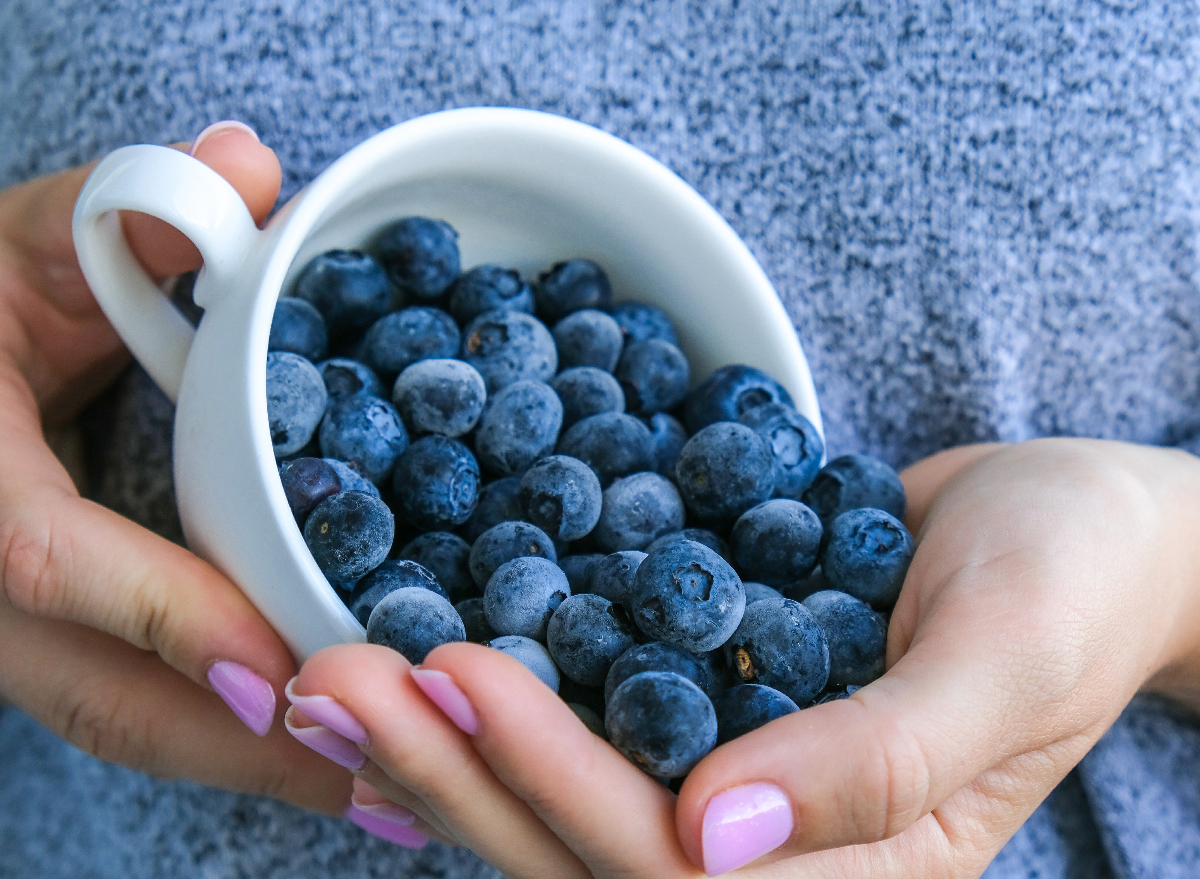
Learning, thinking, problem-solving, decision-making, and being able to pay attention all fall under a term that is referred to as cognitive function. Unfortunately, approximately two out of three Americans experience cognitive impairment, at an average age of 70 years. And while age is the greatest risk factor for experiencing cognitive decline, other risk factors include family history, education level, brain injury, physical inactivity, and chronic conditions such as Parkinson's disease, heart disease and stroke, and diabetes. But believe it or not, the foods you eat—"brain foods," if you will—may impact your cognitive health too.
Studies show that the foods we include in our diets play a pivotal role in supporting brain function, memory retention, and overall cognitive well-being. Generally, evidence finds that low-fat diets appear to be protective against cognitive decline, as do following dietary patterns that include the Mediterranean, DASH, and MIND diets.
If you are looking for specific foods to include in your overall healthy diet to support your cognitive health, look no further than this list of 9 brain-boosting foods. Each item offers unique cognitive health benefits, and they are delicious to boot! Read on, and for more, don't miss 6 Worst Drinks for Brain Health.
Eggs

Eggs are a natural source of nutrients that support brain health, including choline (150 milligrams per large egg) and lutein and zeaxanthin (252 micrograms per large egg).
The choline in eggs helps support lifelong brain health at every age and stage, including memory, thinking, mood, and more. Unfortunately, around 90% of Americans fall short of the recommended intake of choline, and intake declines after age 50 with only 4% of adults aged 71 and older reaching the adequate intake for choline. Eggs are one of the few foods rich in choline and can help Americans meet the recommended daily intake.
Lutein has long been associated with eye health but research has discovered lutein may play an important role in cognition as well. Similar to how lutein accumulates in the eye, it's also present in the brain and has been positively associated with better cognitive function in older adults and academic performance in children.
Routine intake of eggs has been associated with improved cognitive performance in adults, possibly, in part, because of the brain health-supporting nutrients that this food offers. It is important to remember to eat the yolk, as this is where both choline and lutein are found.
Yes, you can (and should) eat the yolk! According to the American Heart Association, healthy individuals can include up to a whole egg or equivalent daily as part of a heart-healthy dietary pattern. For older people with healthy cholesterol levels, given the nutritional benefits and convenience of eggs, consumption of up to two eggs per day is acceptable within the context of a heart-healthy dietary pattern. And vegetarians may include even more eggs in their diets within the context of moderation.
Mushrooms
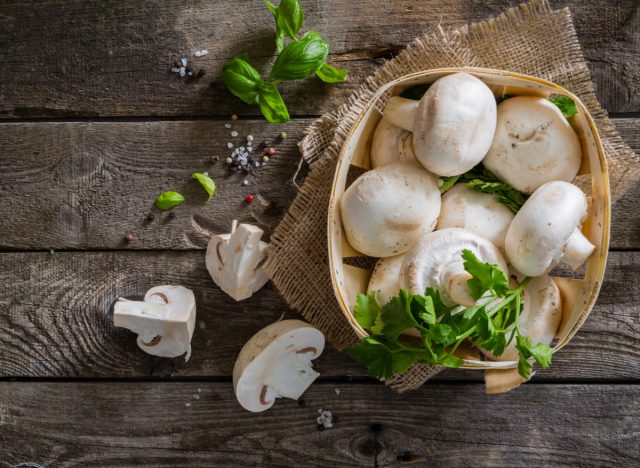
The glorious mushroom is so much more than a meat sub in a vegan-friendly burger. These fantastic fungi are the leading sources of ergothioneine in the produce aisle.
Ergothioneine is an amino acid that functions as an antioxidant. Ergothioneine's anti-inflammatory and anti-oxidative properties make it an important bioactive compound that may contribute to healthy aging, cognitive benefits, and reduced stress when part of a healthy lifestyle and eating patterns.
Researchers published in the British Journal of Nutrition positioned ergothioneine as a "longevity vitamin" suggesting that this veggie may be an important source of this nutrient for supporting healthy aging and cognitive benefits.
Although all mushrooms have ergothioneine, certain varieties contain more of this compound than others. Shiitake, oyster, and maitake mushrooms have the highest amounts of ergothioneine compared to other varieties.
Walnuts
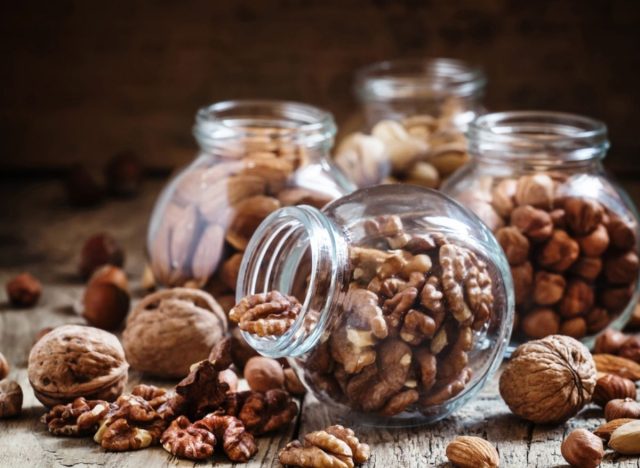
Walnuts are the only tree nut that is a good source of ALA omega-3 fatty acids, which is why they're one of the best foods for brain health. And consumption of these nuts that are packed with this healthy fat may combat oxidative stress and inflammation — two drivers of cognitive decline.
According to the results of The Walnuts And Healthy Aging study, a randomized controlled trial evaluating the effects of eating between 30 and 60 grams of walnuts every day for 2 years, daily walnut consumption might delay cognitive decline among those at higher risk.
Wild Blueberries
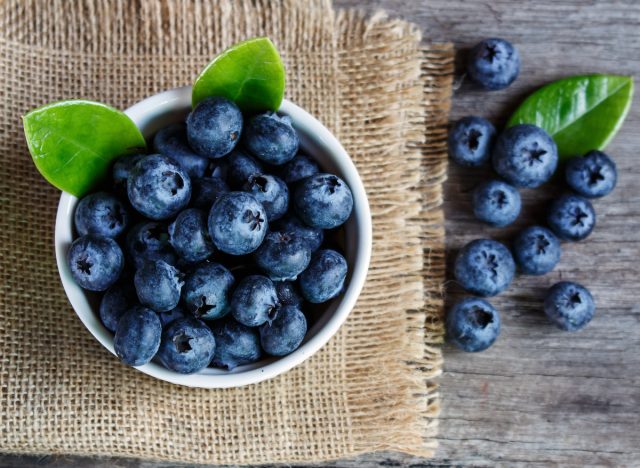
Did you know that there are different varieties of blueberries? Among the choices out there, wild blueberries may offer unique benefits to your cognitive health.
While conventional blueberries are a positive addition to a brain health-supporting diet, wild blueberries have been specifically shown to help older adults experiencing slower cognitive processing speeds think faster according to results of a study published in Nutritional Neuroscience. In this double-blind, randomized placebo-controlled trial, those who consumed wild blueberry powder daily for 6 months had improved processing speed, with those 75-80 years old experiencing the most prominent improvement.
True Tea
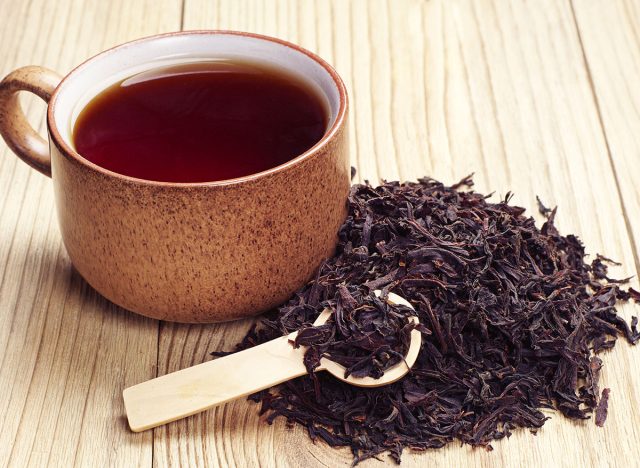
There are four teas that are classified as true teas: black, oolong, green, and white teas. Data has shown that true tea consumption may decrease the risk of cognitive impairment and dementia.
According to a meta-analysis of 17 studies evaluating the association between true tea consumption and the risk of cognitive disorders, results showed that high tea intake was linked to a reduced risk of cognitive disorders. Some evidence suggests that drinking 100 milliliters (less than half a cup) of tea a day may offer a 6% reduced risk of cognitive disorders, and 500 milliliters (a little over 2 cups) a day may offer a whopping 29% reduced risk.
Salmon
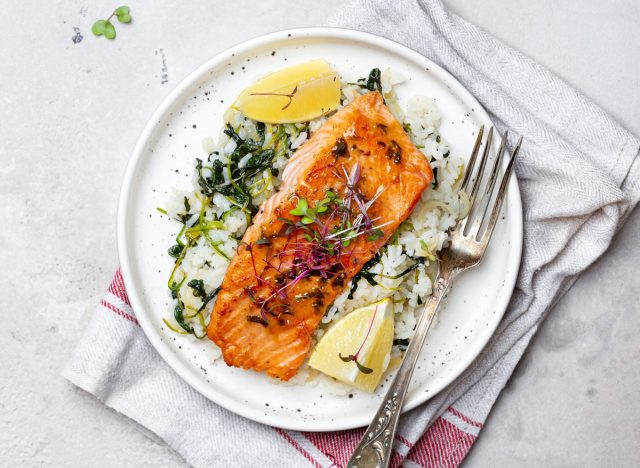
The omega-3 polyunsaturated fatty acid docosahexaenoic acid (DHA) is important for adequate brain development and cognition. This unique fat is concentrated in the brain and it plays an important role in brain functioning. Oily coldwater fish, like salmon, are known for being a source of DHA omega-3 fatty acids, which makes them potent brain foods. But fish is so much more than a source of healthy fats.
As a natural source of protein, selenium, choline, and iodine, (and of course, DHA omega-3 fatty acids) fish like salmon is a true gift for those who are focused on their brain health. Data published in Nutrition shows that intake of non-fried seafood is associated with better cognitive performance in psychomotor speed among US adults, especially those who are overweight or obese.
Oranges
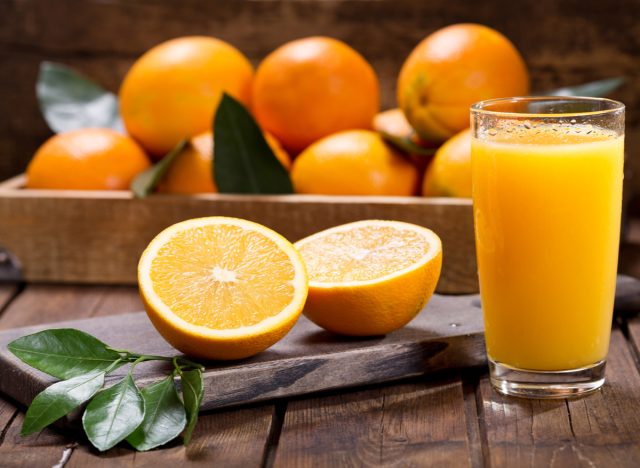
Oranges have a slew of nutrients and plant compounds that may play a positive role in cognitive health when included as part of a balanced diet, including vitamin C, thiamin, vitamin B6, and hesperidin.
A clinical study in healthy older adults published in the American Journal of Clinical Nutrition showed that adults who consumed 100% orange juice every day for 8 weeks, which was made from squeezed oranges, scored better on combined tests for global cognitive function compared to the control group. And another study showed that including citrus fruit and orange juice was associated with better performance on some cognitive tests, among the older adults that were evaluated.
Green leafy vegetables
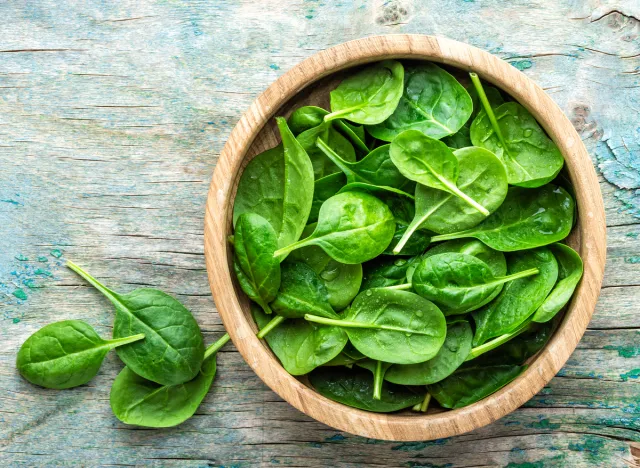
Including green leafy vegetables, like watercress and spinach, may help slow cognitive decline among the older population. Some evidence suggests that this may be due to the nutrients these foods contain, including lutein, folate, and beta-carotene. According to a study published in Nutrients, including a daily serving of green leafy vegetables in a diet may help support brain health.
Watermelon
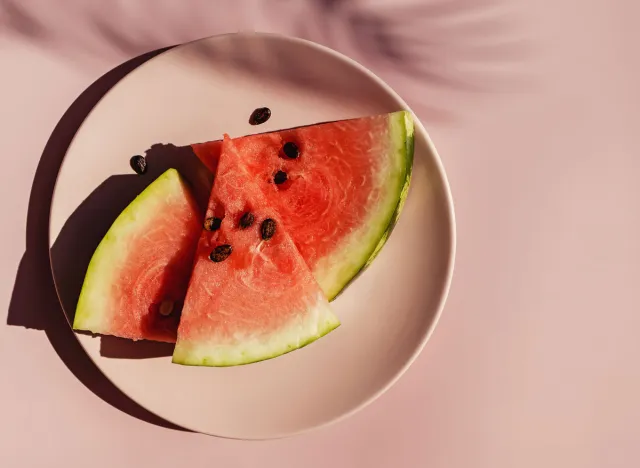
Red and pink-fleshed watermelon is a source of many brain health-supporting nutrients, including a carotenoid called lycopene. This plant compound, which is responsible for giving red-pink watermelon that gorgeous hue, exhibits neuroprotective properties due to its antioxidant and anti-inflammatory functionality.
According to the results of a systematic literature review published in the Journal of Nutritional Science, available data shows a significant positive relationship between lycopene consumption and cognition maintenance. Data also exists that shows a significant association between lower circulating lycopene and higher rates of Alzheimer's disease mortality.
Note that while the red/pink varieties of watermelon contain an impressive amount of lycopene, the yellow and orange watermelon varieties have other important compounds that may support cognitive health as well. For example, yellow watermelon is a richer source of beta-carotene than the red-pink varieties. And beta carotene intake is linked to positive effects on cognitive decline among older adults.
- Source: https://www.ncbi.nlm.nih.gov/pmc/articles/PMC7153285/
- Source: https://www.cdc.gov/aging/pdf/cognitive_impairment/cogimp_poilicy_final.pdf
- Source: https://pubmed.ncbi.nlm.nih.gov/28783055/
- Source: https://ajcn.nutrition.org/article/S0002-9165(22)04779-7/fulltext
- Source: https://www.ahajournals.org/doi/full/10.1161/CIR.0000000000000743?rfr_dat=cr_pub++0pubmed&url_ver=Z39.88-2003&rfr_id=ori:rid:crossref.org
- Source: https://www.cambridge.org/core/journals/british-journal-of-nutrition/article/ergothioneine-an-underrecognised-dietary-micronutrient-required-for-healthy-ageing/92CED7FF201A9FB23BEAFF0D3EAD7316
- Source: https://www.cambridge.org/core/journals/british-journal-of-nutrition/article/ergothioneine-an-underrecognised-dietary-micronutrient-required-for-healthy-ageing/92CED7FF201A9FB23BEAFF0D3EAD7316
- Source: https://www.cambridge.org/core/journals/british-journal-of-nutrition/article/ergothioneine-an-underrecognised-dietary-micronutrient-required-for-healthy-ageing/92CED7FF201A9FB23BEAFF0D3EAD7316
- Source: https://www.sciencedirect.com/science/article/pii/S0002916522010413?via=ihub
- Source: https://pubmed.ncbi.nlm.nih.gov/30941401/
- Source: https://www.tandfonline.com/doi/full/10.1080/1028415X.2022.2117475
- Source: https://www.ncbi.nlm.nih.gov/pmc/articles/PMC8351472/%23:~:text=In%2520a%2520meta-analysis%2520of,reduced%2520risk%2520of%2520cognitive%2520disorders.
- Source: https://pubmed.ncbi.nlm.nih.gov/28496007/
- Source: https://pubmed.ncbi.nlm.nih.gov/27825512/
- Source: https://pubmed.ncbi.nlm.nih.gov/30703573/
- Source: https://pubmed.ncbi.nlm.nih.gov/25733635/
- Source: https://pubmed.ncbi.nlm.nih.gov/20550741/
- Source: https://www.ncbi.nlm.nih.gov/pmc/articles/PMC5772164/%23:~:text=Consumption%2520of%2520green%2520leafy%2520vegetables%2520may%2520help%2520to%2520slow%2520decline,to%2520contribute%2520to%2520brain%2520health.
- Source: https://www.ncbi.nlm.nih.gov/pmc/articles/PMC9930684/
- Source: https://pubmed.ncbi.nlm.nih.gov/31217968/%23:~:text=Among%2520four%2520studies%2520evaluating%2520relationships,of%2520dementia%2520reported%2520significant%2520results.
- Source: https://pubmed.ncbi.nlm.nih.gov/36615894/

